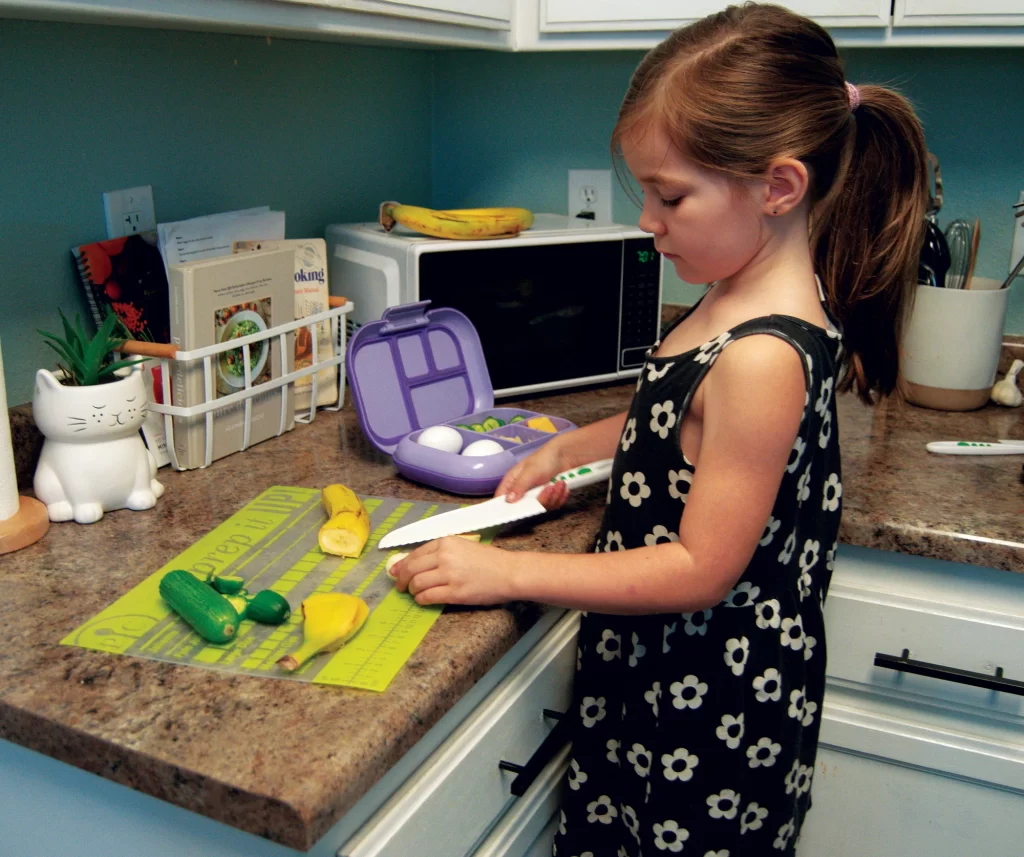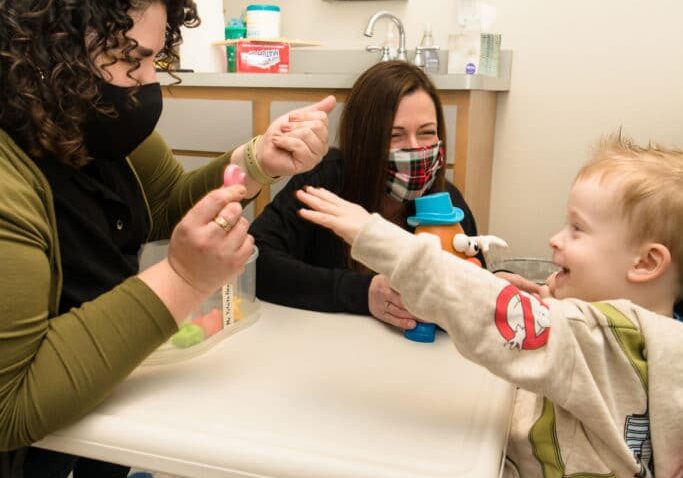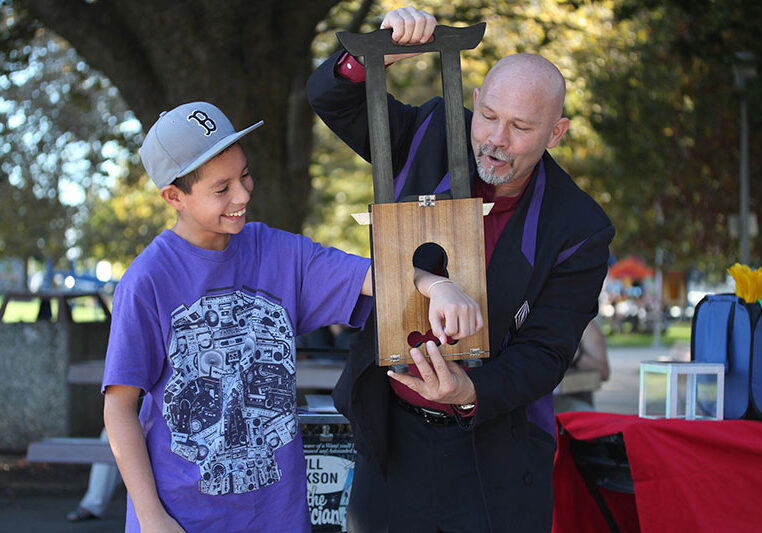It’s that time again . . . let the packed lunches begin (sigh). Within the hustle and bustle of getting your kids out the door in the morning, packing lunches can be one of the tasks that adds to your stress. Making sure that your children eat breakfast is one thing. But doing so while also getting them out the door with a decent lunch? On some mornings, it feels impossible.
First off, go easy on yourself
Parents are juggling so much these days. We put a lot of pressure on ourselves to make sure our children are getting what they need. When we’ve got picky eaters, it gets even more challenging. Make some goals to strive for, but it is OK to have those days where we merely “get by.” Feeding them is better than not feeding them, so it is OK to push the easy button when it’s needed. Finding creative ways to pack in nutrient density can make a big difference.
Stable blood sugar is key to a stable mood and behavior
Kids are growing their bodies and brains AND they are learning and being challenged, requiring energy and focus. Their bodies are hard at work. Children’s brains burn through more glucose than adults do, so long fasting periods should be avoided. The natural fasting period during the night is long enough for a child’s brain to go without energy from food, so don’t skip breakfast. Carbs are important to sustain their energy requirements, but make sure to add in sources of protein to maintain stable blood sugar levels throughout the school day. Unstable blood sugars and hunger will result in erratic behaviors and moods.
Ideally, we would like our kids’ lunches to be easy, nourishing and something that our children will eat. Is meeting these three goals realistic? Let’s break it down with some packed lunch ideas that will satisfy these three important goals for our kids’ lunches.

Six-year-old Aria from Red Bluff is proud to help prepare her school lunch. When children participate in making their school lunches, the food is much more likely to come home in their tummies than in their lunch bags. Photo by Kimberly Parodi.
Goal #1: Lunches that are easy
Use leftovers
I learned early on that I wanted to save time and effort when packing lunches for my son. When he was attending preschool, I would be sure to cook extra dinner the night before for a quick and easy lunch the next day. Starting this habit while he was young made a big difference. He grew accustomed to leftover dinner for lunch at a young age. Meal ideas include soups, chicken quesadillas, pasta or lasagna, taco bowls, Indian dal or curry and rice.
Finger food lunches
Children love choices. Now that bento boxes are popular, lunch boxes with small compartments make it easy for kids to choose from a mix of finger foods. Some selections could include sliced summer sausage or salami, cheese slices, crackers, hummus or cream cheese. Add in some sliced cucumber or pickles to make “cracker sandwiches.” Fill the remaining compartments with veggies, fruits, olives, avocado, nuts or trail mix.
Roll-ups
Roll-ups are an alternative to sandwiches if you want to add some variety to the week. Make savory roll-ups using turkey, cream cheese or hummus and a pickle spear or by using a seaweed sheet, cream cheese, smoked salmon and avocado. Make sweeter roll-ups using tortillas, nut/seed butters with bananas, honey or cinnamon, or cream cheese with strawberries, peaches or other fruits. The ideas are endless.
Goal # 2: Lunches that are nourishing
Similar to breakfast, our children need a balanced lunch to sustain their energy through the school day. Make it a goal to add fiber, protein and fat to their lunches and snacks. Limit the added sugar. When kids eat high amounts of sugar, starchy and high carb foods, their blood sugars and insulin levels can vary widely, leading to mood swings, lack of focus and behavior changes. Fiber, protein and healthy fats can help sustain a stable blood sugar for longer periods. Healthy fats are essential for brain growth as well.
Ideas for adding fiber: whole-grain bread for sandwiches, a variety of fruits and vegetables (leaving the skin on is a plus), nuts and seeds, as well as oats, brown rice and whole grain pasta.
Ideas for adding protein: hard-boiled eggs, eggs baked into foods, meatballs, grilled chicken or fish, jerky, cheese sticks and protein bars (> 8g protein). Include some granola to eat with yogurt to add in more protein (and fiber). Look for low sugar bars and granola.
Ideas for adding healthy fats: olives, avocado or guacamole, nuts such as macadamias, pecans or brazil nuts or add in an easy no-bake fat bomb or energy ball. Coconut oil, butter or ghee are excellent options to add into your cooking.
Goal #3: Lunches your kids will eat
Now that we’ve covered easy and nutritious lunches, will the kids eat them? What good is an easy and nutritious lunch if the food comes back home, or worse, it ends up in the trash at school? This can be challenging, especially for children that are picky eaters.
Start good habits from the beginning
Most children will go through picky-eating stages. However, infants that are fed a wide variety of tastes, textures and foods – and if this remains consistent through toddlerhood – can help keep the picky-eating habits mild or short-lived.. Keep offering a wide variety of foods with every meal and avoid becoming a short-order cook for each child’s preferences.
Involve your kids in creating their lunches
- Find creative ways to allow your children to be involved.
- Provide them with lists of high fiber, protein and quality fat foods. Let them pick from each list and create their own lunch. This may not be something you can do every day, but even once a week can allow them some autonomy and begin to teach them about nutrition.
- Let them be creative with roll-ups. Encourage them to try new combinations of ingredients.
- Encourage them to “eat the rainbow” to add variety to their diet. Challenge them to eat plant-based foods that are red, orange, yellow, green and blue/purple each day. M&M’s and fruit loops don’t count!
- Include choices they love.
- Be sure to add some of their favorite snacks or treats. It will keep lunches interesting for them and it will teach them that finding balance is important.
Posted in: Health & Nutrition
Comment Policy: All viewpoints are welcome, but comments should remain relevant. Personal attacks, profanity, and aggressive behavior are not allowed. No spam, advertising, or promoting of products/services. Please, only use your real name and limit the amount of links submitted in your comment.
You Might Also Like...

Heartfelt Health Care For Those Experiencing Homelessness In Redding
“I take care of wounds, drain abscesses, start blood pressure medicine, treat diabetes and treat psychiatric conditions,” says Dr. Kyle Patton, M.D., medical director of the Hope program at Shasta […]

Serving Up Sleep – Nutrients That Support Healthy Rest
Between midnight feedings, bad dreams, and bouts with the flu, most parents are well acquainted with the wee hours. Familiar, too, is the groggy haze that lingers the morning after […]

Siskiyou County Schools Tackle Tobacco
“Eighty-one percent of California teenagers prefer dating non-smokers,” recites Maya, a Butteville Elementary sixth grade student who is rehearsing for one of a series of recorded tobacco awareness ads to […]

Full Circle Speech Therapy: Early Intervention For Children At Every Age
The first smile. The first word. The first step. Watching a child develop is one of the greatest joys of parenting. But what happens when you’re concerned about your child’s […]




